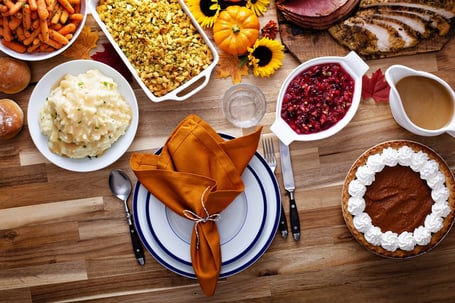 Not long from now, families all over America will be sitting down to a meal that looks back to that first Thanksgiving, in which the Pilgrims celebrated the harvest after a harsh winter. The year was 1621, and Governor William Bradford proclaimed a day of thanksgiving, which the colonists celebrated as a traditional English harvest feast.
Not long from now, families all over America will be sitting down to a meal that looks back to that first Thanksgiving, in which the Pilgrims celebrated the harvest after a harsh winter. The year was 1621, and Governor William Bradford proclaimed a day of thanksgiving, which the colonists celebrated as a traditional English harvest feast.
George Washington declared Thanksgiving a holiday in 1789, and in 1941 Congress passed a resolution which decreed that the holiday should fall on the fourth Thursday of November.
Feasting together is as old as the human race. It is a way of celebrating and enjoying time with family and friends. But if we are not careful, we can overdo the festivities and end up setting ourselves back over the Thanksgiving holiday weekend.
Just How Big Is Your Meal?
It’s hard to believe, but the average Thanksgiving meal contains 3,000 calories and 229 grams of fat. And most of us don’t limit ourselves to one indulgent meal. It’s typical to snack and celebrate all day long.
The trouble comes when we have to deal with those extra calories that we have packed into our bodies. “A 160-lb. person would have to run at a moderate pace for four hours, swim for five hours, or walk 30 miles to burn off a 3,000-calorie Thanksgiving Day meal,” said Dr. Cedric Bryant, ACE chief exercise physiologist, in this article. Many people start by snacking throughout the day, and that combined with the meal can lead to a total caloric intake of 4,500.”
Nutrition and Fitness Tips for Turkey Day
The good news is that you don’t have to forgo your favorite holiday foods. There is room for a little indulgence at a holiday feast! The secret is to have a plan as we head into the holiday season. By staying on top of both your calorie intake and your physical activity, you can enjoy your favorite foods in moderation and emerge on the other side just as fit as you are now.
- Plan your meals. If you know that you are going to be having some heavy, celebratory meals in the upcoming days, limit your intake at other meals to help keep your diet balanced out. Don’t skip meals, but make them lighter and be sure to include plenty of healthy, lower-calorie foods. For instance, if you are going to have a big lunch, eat a smaller breakfast and dinner.
- Look at the big picture. Keep up with how you eat during the several days surrounding Thanksgiving. It’s not a good idea to indulge at every opportunity that presents itself. If you splurge heavily one day, take it easy the next.
- Keep moving. The last thing you need this time of year is a slowed-down metabolism. Staying active is a great way to give your body a fighting chance to negotiate the extra calories you will be consuming. To get the biggest bang for your exercise buck, do regular strength training moves. Even after your strength training session has ended, your metabolism and calorie burn remains high.
Strength Exercises You Can Do Anywhere
Here are some simple strengthening exercises you can do no matter where you are—whether in your office at work or at the in-laws’ house.
- Push-ups. If you aren’t used to doing push-ups, start with your hands on a raised surface such as a desk. As you gain strength, you can gradually move to doing them fully on the floor.
- Lunges. For extra credit, hold dumbbells or other heavy objects in your hands while lunging.
- Squats. To do a proper squat, start with your feet shoulder width apart. Begin to lower your body as if you were going to sit in a chair. Try to reach a level where your quads are parallel, and then stand back up.
- Step-ups. Find the nearest step, and with alternating legs step onto the step with one leg and then step back down. Again, holding heavy objects in each hand will increase the effect.
There is no need to pack on the pounds this Thanksgiving. Figure out your strategy now, and then when the festivities start, just work the plan!
This blog was written by Ashley Duncan, Weight Loss Coordinator. To find out more about the NIFS bloggers, click here.

